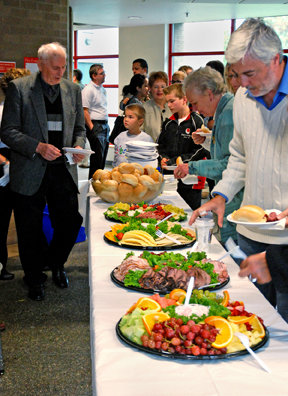Sustainability theme for World Food Day at Kwantlen
October 25, 2010 by Hayley Woodin · Leave a Comment
Sustainability was the theme for World Food Day 2010, and while the day has already come and gone, organizers have aimed to have a lasting impact.
On Monday Oct. 18, Kwantlen students and faculty took part in a free United Against Hunger event at the Langley campus.
In addition to food and cake, education was served up by numerous speakers that presented between 9 a.m. and 1:30 p.m.
Among the presenters were Dr. Deborah Henderson, Kwantlen’s Director of the Institute for Sustainable Horticulture, Dave Stark, the director of Langley Food First, and Langley Mayor Peter Fassbender.
The event was sponsored by the university, the Food and Agriculture Organization of the United Nations and the Food For Famine Society, a Langley-based company that sends a food supplement called Cibo to starving children overseas.
Kwantlen’s World Food Day focused on the importance of local sustainability, in keeping with the idea that hunger can be fought at international, national and regional levels. While the event was positive and meant to encourage local action, it did touch on the world’s current environmental situation, which was less than positive.
“Canada is really bad… needing four to six planets to keep our lifestyle alive,” Henderson said to attendees in the school’s auditorium.
The topics discussed included agricultural pollution, healthy living, food production and fair trade.
“It is a moral obligation to feed ourselves,” Henderson continued, before highlighting the benefits to producing food locally.
And, with regards to trade, “We’ve gone past the point that makes sense,” she said, noting that importing food that can be grown here is simply excessive.
Langley’s farmers market at Kwantlen continues to grow
September 25, 2010 by Jeffrey Yip · Leave a Comment
An interview with Susan Davidson, vice chair of the Langley Community Farmers Market board of directors, about the farmers market and their partnership with Kwantlen’s Langley campus. For more information visit the Langley Community Farmers Market website. Video by Jeffrey Yip and Matt Law.
Kwantlen’s ISH lab finds a second home in Cuba
September 25, 2010 by Jeffrey Yip · Leave a Comment
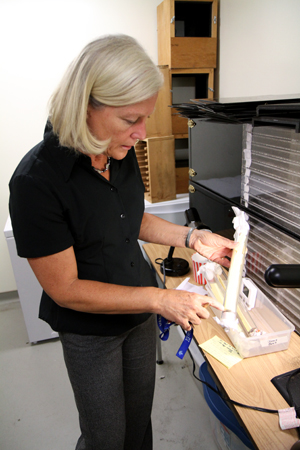
Dr. Deborah Henderson showing how trichogramma sibericum, a tiny parasitic wasp, is produced at the Institute for Sustainable Horticulture's research lab. The wasp is used to help control fireworms, an insect pest that attacks cranberries. (Photo by Jeffrey Yip)
While it still hasn’t put its sign up, the Institute for Sustainable Horticulture lab, or ISH lab, is now up and running.
“I’m glad you came a year after opening … because when it opened we had an empty lab,” Dr. Deborah Henderson said.
Henderson has a PhD in entomology from UBC and a post doctorate in medical entomology from the University of Toronto. Before coming to Kwantlen, she had her own company, ES Crop Consulting Limited, a consulting company in agriculture that provided integrated pest management, monitoring services for farmers, and research and field trials in biological control products.
“It took far longer than I had ever thought to get it up and moving. But, we’re pretty functional now.”
While the ISH lab isn’t a teaching facility, its research project are very much integrated with Kwantlen’s School of Horticulture and the Environmental Protection Technology (EPT) program.
And one of the most important collaborations that the ISH lab has with the two programs is a project in Cuba.
Six students headed for Cuban farms
“There’s a food security project in Cuba and a number of field research trials going on there,” Henderson said. “So, we have six student going to Cuba at the end of October to spend three months working on bio control field trials on a cooperative farm. Two of them are EPT students and four of them are horticulture students.”
Henderson hopes to continue this project over the next three years.
“[W]e want to make it a regular program with Cuba, and integrate it into the new degrees that are in the School of Horticulture. So there could very well be in the future, a course that’s offered in Cuba in the winter term. The students would go down and take that course in Cuba and get credit here,” Henderson said.
According to Henderson, Cuba is the world leader in the use of biological controls, that is using fungi, viruses and other insects to control crop damaging insects.
When the Soviet Union collapsed in the early 1990s Cuba lost nearly 90 per cent of its imports, including food and petroleum products. As the country began to starve, the government enlisted the country’s farmers to find a solution to the food shortages. There answer was to turn much of the available space in the cities into organic vegetable gardens. Because the gardens were in the cities, the food was organically grown, with no chemical pesticides. Instead they used bio controls.
“They’re still using chemicals for some production out in the country,” Henderson said.
“So, the project that we’re working on is the conversion of large cooperative farms to ecological methods. And the students are going to be involved in that. [W]e have a 600-hectare farm that has agreed to convert to these ecological methods.”
Working closer to home
Closer to home, the ISH lab is also conducting research with biological controls. The biological controls the ISH lab works on are a naturally occurring part of the ecosystem. The lab isolates them, makes more of them and tests them to see how effective they are in controlling insects that damage food crops.
But, unlike other labs, Henderson wants their research to go one step further and take successful bio control products all the way to commercialization.
“We’ve got to get products in the hands of growers or else our research isn’t benefiting the people that need the research done,” Henderson said.
A major part of the lab’s work with bio controls has to do with horticultural sustainability. For the ISH lab, achieving sustainability will also focus on how climate change will affect food production, and looking into new production systems that are closer to market will reduce the use of fossil fuels to bring products from far away.
“We are very unsustainable as a species. We have to become sustainable. So any time we can replace unsustainable practices we’re a step towards that goal. And so my particular expertise and experience is doing exactly that,” Henderson said.
“[W]e are going to have to face the reality of climate change. We have a responsibility to take care of our own food security. How can we help anybody else when we can’t feed of ourselves. And right now we don’t feed of ourselves.”
British Columbians ‘want sustainable food production’
According to Henderson, only four per cent of B.C.’s land is arable, that is land that can be used for growing crops. But, Henderson believes British Columbians are sensitive to food security issues and want food production to be sustainable.
“I think we are in great shape. [W]e grow close to 250 crops in B.C. already. So, in that sense we have a pretty big advantage over the Prairies for instance,” Henderson said.
“Quite honestly I think there’s a big social benefit to growing your own food close to home and knowing where your food comes from … and not being so divorced from it that you think it comes from a grocery store.”
As part of being sustainable, the lab itself is doing its part.
“It’s a beautiful facility. It’s been made to be as energy efficient as possible. We’ve applied for LEED certification on it, that’s a designation for environmentally friendly buildings,” Henderson said.
The lab has two sides: microbiology, where they do the research on fungi, and entomology, where they do research with insects and insect viruses. The lab also has production facilities for making fungi and rearing predator and parasitoid insects.
Overall, Henderson seems pleased with the progress the lab has made over the past year, especially in its collaboration with Kwantlen’s horticulture and EPT programs.
“The kind of things we do now with students, I’ve written internships into all of our research proposals,” said Henderson.
“So many of our programs are applied focused … so our research is [also] applied focused. And they enhance each other.”
“We’ve got a little turf project where we’re going to look at compost on turf and so I’m going to communicate with the turf instructors to say, ‘Would you like to get your students involved? Here’s what I have in mind. Do you have any better ideas?’ And we’ll do it with them so that students can be involved.”
Video: Langley campus dances in the Year of the Tiger
February 16, 2010 by Abby Wiseman · 1 Comment
In honour of the Lunar New Year the Langley Community Services Society hosted a multi-cultural performance at Langley campus on Feb. 6.
Tai Chi Fan, Tango, Korean drums and Chinese Folk dance are just some of the many dances performed to welcome in the Year of the Tiger.
Abby Wiseman and Kristi Jut captured the event on video.
Kwantlen, KSA distribute on-campus H1N1 vaccines
January 20, 2010 by Jacob Zinn · Leave a Comment
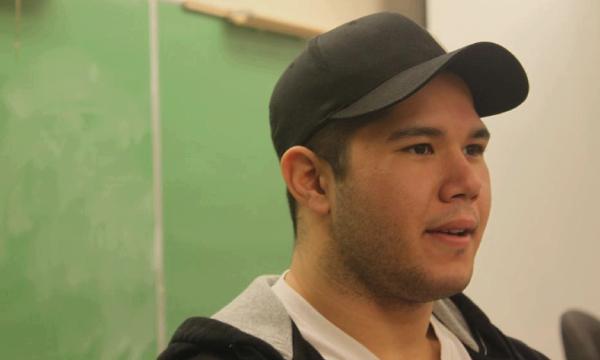
Brandon Tuason, a history and arts student, thinks it's important for students to get the H1N1 vaccine and keep from spreading the virus through the student population. (Jacob Zinn photo)
In a joint effort, Kwantlen Polytechnic University and the KSA are providing free H1N1 vaccinations this week to students and employees at all four campuses.
Since Tuesday, more than a hundred on-vaccinations have been administered at the Surrey and Richmond campuses.
Lesley England, a registered nurse with ProGroup, said the turnout for vaccinations has been quite good. On Monday, she expected to give 70 vaccinations at the Surrey campus. She gave 88.
By 12:30 p.m. on Tuesday, she’d vaccinated another 45 students on the Richmond campus.
“A lot of people who are getting the H1N1 [vaccine] have never had flu vaccines before,” said England, who is expecting a third wave of the H1N1 influenza virus to arrive in February.
Nurses will visit the Langley campus Thursday and the Cloverdale campus Friday in hopes of immunizing procrastinating students.
When the H1N1 vaccine was being developed last fall, the KSA hoped to include it in the health and dental plan. However, the government purchased enough of the vaccine for all Canadians and offered it for free at clinics.
“It’s readily available now. You can go to your doctor and get the shot,” said Eddie Lee, coordinator of the Student Health Improvement Program.
“However, we know that there are students and employees who probably still won’t go–it’s a lack of convenience for them, so we decided to bring it on campus.”
It’s that inconvenience that has kept Nick Mostar, 22, from finding time for the vaccination.
“I’ve been doing schoolwork and haven’t really had the time to go to a clinic or anything,” said Mostar who is in the engineering program.
Not all students have waited quite as long. Brandon Tuason, 21, got the H1N1 vaccine several months ago. He was at risk of getting the virus because, at birth, he was diagnosed with severe asthma, making him more prone to infection.
“We’re in an environment where everybody’s kinda in close quarters,” said Tuason. “Infections can spread really quickly. I think the school is taking a good initiative in preventing a lot of that by giving the immunization away.”
Langley KSA director takes to the stage
December 18, 2009 by Mitch Thompson · Leave a Comment
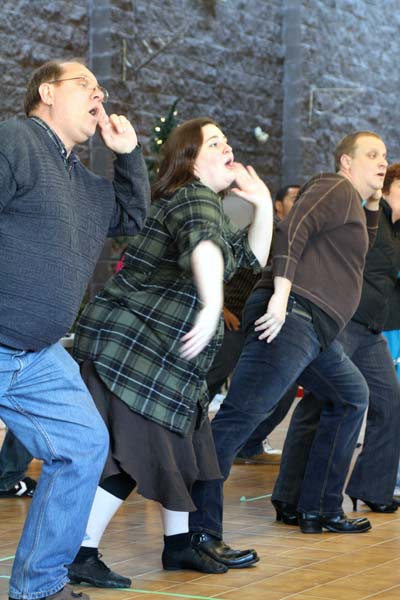
Jennifer Campbell joins her fellow actors in one of the plays many choreographed dane routines. (Katie Lawrence photo)
While her weekdays are filled with homework and studying, Jennifer Campbell’s weekends consist of slapstick comedy, merry songs and the eternal struggle of good versus evil.
Such is the life of an actor.
Campbell, the KSA director for Langley campus, has had a love of acting since Grade 1, and is currently rehearsing for a production of Robin Hood.
The familiar tale is of the cunning Robin Hood who steals from the rich and gives to the poor, thus foiling the plots of the wicked Sherrif of Nottingham and winning the hand of fair Maid Marian.
The play is in pantomime form, which, contrary to popular belief, includes quite a bit of talking and even singing.
“It’s very loud. There’s a whole lot of audience participation,†said Campbell.
She explained that pantomime, or “panto†as it is commonly known, is a specific style of theatre with several reoccurring elements.
A woman always plays the lead male role in a panto, and the play also features dames: men dressed up as women.
“It’s supposed to be like an asexual character, so the dame can make fun of both sexes and it doesn’t matter,†she said.
For Campbell, who is a part of the chorus and plays the girlfriend of Little John, the panto was an opportunity to get back into something she loves.
“I feel more like myself and more confident on stage than I do anywhere else,†she said.
The constant rehearsing since September has created a close group, which Campbell appreciates.
“I think it’s just being onstage and being a part of a family,†she said. “My very first day I was greeted with a hug.â€
Robin Hood runs from Dec. 17 to Jan. 3 at the Surrey Arts Centre and tickets are $24.95 for adults, $19.95 for students and seniors and $12.95 for children under 12.
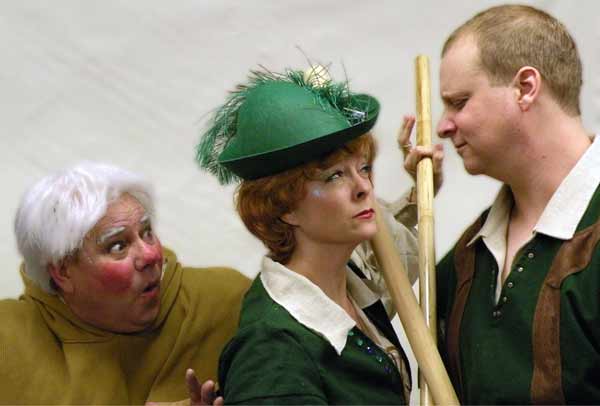
Mandy Tulloch, as Robin Hood, challenges Little John, played by James Knowlden, to a battle. (Photo courtesy of the production)
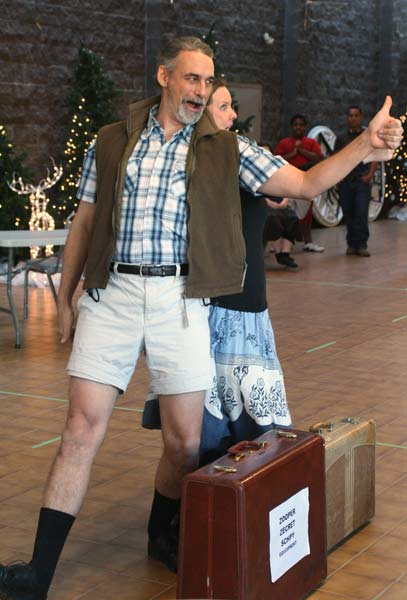
Frauliene Kibbles, played by Shara Nixon, and Herr Bitz, played by Michael Charrois, express satisfaction about their arrival in Nottingham. (Katie Lawrence Photo)
Special report: Horticulture studies offer sustainability solutions
December 17, 2009 by Sarah Jackson · 2 Comments
Introduction: The Institue for Sustainable Horticulture
A video interview with Deborah Henderson, director of the Institute for Sustainable Horticulture.
The program: Experiments, hands-on experience drive program, students
At Kwantlen’s School of Horticulture, modern-day environment concerns meet experimentation and hands-on experience.
The school, located at the Langley campus, has assumed a high profile in recent years for its innovation in the field of horticulture.
The Institute for Sustainable Horticulture, a research laboratory which opened in October, received millions of dollars in government funding for its initiative to breed insect, fungus and viral bio-controls that have the potential to replace chemical pesticides as eco-friendly alternatives.
Another project, the construction of a geothermal-heated greenhouse that aims to cut the use of electrical power in Kwantlen greenhouses, is currently in progress. And recently, the school was recognized for installing a “green roof†at the new Salvation Army Gateway of Hope shelter adjoining the campus. The roof will provide food and herbs for the shelter’s kitchen, moderate storm-water runoff and increase building energy efficiency.
Students at the school also regularly participate in experiments testing products such as fertilizers for local companies.
“It’s so important for people to understand what horticulturalists do,†said Michael Cain, a practical horticulture apprentice. “You need plants to grow and be healthy for the Earth as a whole to be sustainable.â€
The four-level apprenticeship program, which runs from November to March during the industry’s off-season, gives students hands-on experience in plant-growth, irrigation, machine maintenance and other field work. The apprenticeship students are all currently working in the industry and returned to school to add education to their experience. The program gives students the option to study production horticulture (which focuses on nurseries), propagation and plant-growth or landscape horticulture (which focuses on turf management, design and machine maintenance), after the first two levels of core courses in science.
The school also offers a degree in integrated pest management; diplomas in greenhouse nursery and production, landscape design and installation, and turf management; and 11 different citations.
Cain, superintendent of Guildford Golf & Country Club, is optimistic about the future for horticulturalists. “Everyone’s going green now,†so knowledge about growing healthy plants is invaluable, he said.
Landscape horticulture received a Red Seal approval in several provinces, including B.C., in 2008. Apprentices now fulfill government testing to receive a Red Seal journeyman ticket upon graduation, which legitimizes the industry as a trade and provides a national license to operate.
“Anyone could call themselves a landscaper at one point… People were doing a lot of damage killing trees and planting stuff in the wrong places,†said the 37-year-old Cain. “Now, what you’ll find when people start getting more qualified, is our landscapes will be more sustainable, grow healthier and bigger and be free of diseases and pests because they’re grown properly and maintained properly.â€
Cain found the School of Horticulture a good fit after 20 years of work in turf management. Two kids, a job and a mortgage limited his educational opportunities, but the timing of Kwantlen’s apprenticeship program allowed him to continue to support his family during his education.
“I love that my office [at Guildford Golf & Country Club] is 150 acres of green space,†he said. “I just want to be a better steward of our environment.â€
Knowledge about plants, pest control, irrigation and machinery could potentially allow horticulturalists to grow plants, shrubs and trees that last for hundreds of years, said Cain.
“You’re never going to be rich… but it’s a really rewarding career choice because you’re surrounded by nature.â€
Horticulture students at work
Choir offers more than just Christmas spirit
December 7, 2009 by Justin Langille · 1 Comment
Snow hasn’t fallen on Metro Vancouver yet this winter, but it won’t be long from now if Gail Suderman has her way with the season.
For the last nine years, Suderman, the director of voice and choral studies at Kwantlen’s Langley campus, has spent most of her time teaching Kwantlen students to sing classical music.
But in her spare time, she indulges in her love of more contemporary music, helming the Good Noise Vancouver Gospel Choir, one of only four community choirs devoted to singing gospel music in Vancouver.
Every year, Suderman and the choir perform Christmas carols and pop music favorites at the Christ Church Cathedral in downtown Vancouver for two nights before Christmas to get people in the spirit of the holidays.
She recalls that the choir ended last year’s show just as Vancouver’s picturesque white Christmas began.
“The memories that particularly stick in our mind are when snow is involved,”said Suderman. “The last night [last year] right as people were walking out, the snow started falling. It just added to that Christmas energy, that spirit of it.”
The concerts usually end up selling out every year and are wildly popular with Vancouverites looking for a unique musical experience around the holiday, said Suderman.
This year, the choir will perform its Glory of Christmas concerts for two sold-out nights on Dec. 11 and Dec. 12 at the cathedral. There will be another performance during the afternoon of Dec. 13 at the Frasierview Church in Richmond.
Suderman, a classically trained singer, and her colleague Marcus Mosely, started the Good Noise Choir in 2004 out of a mutual love for the energy and celebratory spirit of gospel. After doing some workshops with people in the community and being inundated with requests to keep going, she held auditions and did the first Christmas concert at the Christ Church Cathedral that December.
“It took off just like wildfire, in terms of people being excited about it and people coming out to concerts,”said Suderman.
Since its debut, the choir has grown from 42 to 75 members and includes people of all ages and walks of life. Some people come from as far as Abbotsford to train with the choir throughout the year. Members have to audition to join the choir, but the choir is non-denominational, which makes it open to anyone in the Lower Mainland who wants to sing.
“It’s a bit of a microcosm of what real life is like,” said Suderman. “It’s a great example of this diverse group of people coming together, creating this sort of unified sound through the singing. It has a really good energy.”
When not performing Christmas carols, the choir performs at events such as the Vancouver Folk Festival and has its own concert series that runs throughout the year at Christ Cathedral Church. Years of hard work paid off recently, said Suderman, when the group got a chance to perform for superstar record producer David Foster, who produces albums for the likes of Celine Dione and Michael Buble.
Suderman admits that the Good Noise choir enjoys popularity in the Lower Mainland, but that there isn’t as much of a culture around gospel music in Vancouver as there as there is in the United States, where the music has ethnic and cultural roots in African-American culture.
Vancouver is home to more classical and church-based choirs, but only a few popular music, or contemporary music choirs, the category that she feels Good Noise belongs to, said Suderman.
“It’s not that we feel isolated in terms of the choir itself,”said Suderman. “We are a little bit unique. I wouldn’t say that people are surprised that there are gospel choirs in Vancouver area. Because it’s unique, people take an interest in it. People say. ‘Ah, this is kind of different, let’s check it out.’”
This year, Suderman has invited three Lower Mainland music industry mainstays to join the choir for the holiday rejoicing. Kate Hammett-Vaughn, Karin Plato and Jennifer Scott, known as the Jazz Divas, will join the choir onstage to celebrate the holiday spirit.
Gospel is a music of celebration, which makes the Christmas holidays the perfect time for the Good Noise choir to rile up audiences and help Canadians shake off their reputation for being subdued at concerts.
“They love it,” Suderman said of the audience that shows up for the Christmas concerts. “It’s different than if you went to a classical concert, where you would sit quietly and be polite. For these [Christmas concerts], clapping along, singing along, it’s all part of it. It’s audience participation and people love, love that aspect.”
GBTR Successful Aging Festival full of life
December 1, 2009 by Kristi Jut · 2 Comments
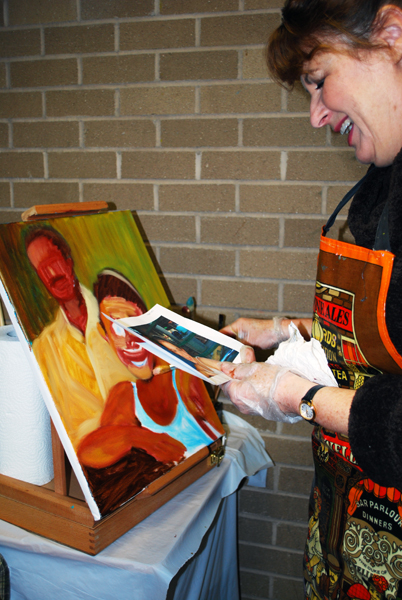
Robin Bandenieks wanted to lure community seniors to art as a form of recreational therapy at the Successful Aging Festival on Kwantlen's Langley Campus, Friday Nov. 27. (Kristi Jut photo)
Afternoon naps and tea parties for senior citizens in Langley? Not likely.
Kwantlen’s Gerontology-based Therapeutic Recreation students put together a lively Successful Aging Festival on the Langley campus on Friday, Nov. 27.
The 20 students graduating from the program this year had to plan an event as part of their course requirements. Instructor Carol Hansen said she was extremely pleased with the outcome of event, which the students have been planning since September. The money raised from raffle tickets and donations will go toward community activities for seniors.
GBTR student Jenni Scott said students in the program had sent out posters and flyers to homes and throughout the community to promote the Successful Aging Festival.
The festival, which included over 30 kiosks that supported senior recreation, as well as a tarot-card reader and door prizes, lured many senior citizens from Langley and surrounding communities.
“It’s important to spread awareness to the community about senior-recreation,†said soon-to-be graduating student Aubrey Morrison. “Not a lot of people know that there are activity groups or outreach programs available.â€
Robin Bandenieks from the Fort Langley Artists group was there to promote an active interest in the arts to the aging community.
“I’m here to hopefully talk someone into taking up painting as a hobby,†said Bandenieks. “[Painting] can improve cognitive skills in older people,†she said, also noting that it keeps the brain active and is a defense against the effects of Alzheimer’s disease, which is common among the elderly.

Students anticipating graduation from GBTR program organized the entire festival, including games, raffles, kiosks and door-prizes. (Kristi Jut photo)
Volunteer Parish nurse and senior citizen Agnes Bauer from the Ladner United Church was also there to promote workshops and activities for the community. “We run a disabilities support group,†said Bauer, but wanted to inform that seniors need the same type of counseling that younger people do—including issues with sex and drugs.
“We just had a very successful HIV workshop,†she said. “Some seniors think AIDS and HIV is not an issue for them, but they’re mistaken if [they] think they’re getting out of this life without knowing someone with HIV or AIDS.†Bauer also made a point of speaking on the church’s addictions program, which ranges from addictions to shopping, sex, and, of course, drugs.
Langley Seniors Centre leaders Donna Benoit and Arlene Brown had a lot to offer the senior’s community, with an extensive outreach program for lonely or dependant seniors and an adult day centre to provide relief for caregivers. The centre has worked closely with Kwantlen, they said, and has helped inform people about their programs.
Brown emphasized that awareness about the programs have become increasingly important. “However old you are now,†she said, “you’re going to be a senior one day.â€
The campus was free of paid-parking for the day of the event.

A White Rock senior takes advantage of the late-November sunny day by keeping active. (Kristi Jut photo)
Langley cupcake sales aids heart fund
February 16, 2009 by Cori Alfreds · Leave a Comment

Jennifer Campbell shares a laugh while selling cupcakes at the Langley campus. (Cori Alfreds photo)
KSA’s Langley campus representative, Jennifer Campbell, embraced Valentine’s day and made 600 cupcakes in 10 hours for a fundraiser.
“We wanted to do something for Valentine’s day and then we decided to make it a fundraiser for a charity,” she said.
All of the money raised will go to the Heart and Stroke Foundation and it will be matched by Kwantlen. The cupcakes were sold for a minimum donation of $1.
By Wednesday afternoon Campbell had raised about $175. She said that they still had “tons of cupcakes” left and if they don’t sell all of them by Friday they will probably give them to local homeless shelters.

